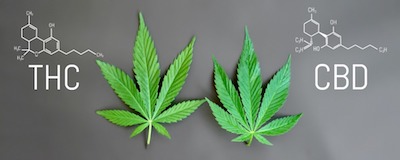If you wish to re-publish this story please do so with following accreditation
AUTHOR: Heather Allman
PUBLISHER: CANNABIS LAW REPORT
We’re a month past 4/20, and lots of people took advantage of the holiday to indulge in a bit of weed. But, what do people really know about pot anyway? According to a recent survey by Invisibly, not much.
In their study released April 1, 2021, “CBD Usage In America: A Snapshot,” Invisibly found out the following facts:
58% of respondents idn’t know the difference between CBD and THC-containing products such as marijuana, and probably because people don’t know the difference, 53% of respondents would not consider using a CBD product for any reason:
They broke down the data and looked at these responses of people who have used CBD. It turns out that only 64% of respondents who have tried CBD did understand the difference between the compounds. 36% of respondents who have tried CBD did so without knowing the difference between CBD and THC-containing products:

Highlights
- They surveyed 1087 people to learn about their knowledge of, and interest in using CBD products.
- 58% of respondents didn’t know the difference between CBD and THC-containing products such as marijuana.
- 53% of respondents would not consider using a CBD product for any reason.
- The results show that 62% of people have never tried a CBD product and the majority are also unwilling to try one.
- 40% of respondents who have tried CBD products said their primary reason was to reduce stress.
- Women are the biggest consumers of CBD products and they are using it in both topical and ingestible forms.
In her May 2021 interview with Cannabis Law Report, Laura Vestel, VP of Marketing at Invisibly, discussed CBD Usage In America: A Snapshot —their recent research study, its most interesting discoveries and outcomes, and the study’s invaluable insight regarding current CBD use in the United States.
Cannabis Law Report: Please introduce yourself and tell us a little bit of background about Invisibly and this recent CBD study.
Laura Vestel: I’m Laura Vestal, and I work at Invisibly as the VP of Marketing. Invisibly is a tech startup, founded by Jim McKelvey —who’s also the co-founder of Square— and we have a real time research survey tool that we’ve been using to basically take a pulse on America and see what people’s sentiments are around hot topics; and CBD is certainly a hot topic these days.
CLR: It is probably the hottest topic these days, I would venture. Your study came out April 1, 2021, called “CBD Usage In America: A Snapshot”?
Laura: Correct. At Invisibly, we used our real time research survey tool to poll Americans, and basically learn about their knowledge and their interest in using CBD products.
CLR: That’s wonderful to hear, because I think that is an under-developed area for research companies. How did you choose the respondents for this particular study?
Laura: Our product is interesting because our real time research surveys are actually completely voluntary, and the content is embedded in websites that people are already viewing online. So, it was voluntary, and we surveyed all of America.
We have just over 1000 respondents to ensure the sample size was right, but like other survey providers, we don’t go to a specific group and have a focus group that people are paying for to participate in. We have completely voluntary responses.
CLR: That would be how you differ from most traditional polling.
Laura: Exactly, yes.
CLR: About THC versus CBD, would public cannabis education help the situation?
Laura: That’s an interesting thought because one of the things that our results show that was very interesting was, well CBD has been a hot topic in the media, most people have actually never tried to CBD products 58% haven’t tried them and many still don’t know the difference between CBD marijuana and THC.
CLR: So, based on the results I’m sure some sort of awareness campaign would make absolute sense.
Laura: In fact, we actually have a media activation arm and do work with several clients to run media for them.
CLR: That’s excellent to get the word out there because that was the most surprising data, I read was the 36% of respondents who had tried CBD without knowing the difference.
Laura: Absolutely. Especially as so many CBD stores are popping up and kind of all over the U.S., and it seems like I’m seeing billboards about it more and more. I think the topic is out there, but I think there’s a general lack of awareness.
CLR: It seems most interesting to me that women are the largest group at 59%. How do you think that’s going to trickle down or ripple effect to the other groups?
Laura: That’s interesting, because I think we also dove into the use cases. Basically 47% of respondents who said they would consider using a CBD product 24% said that they would use it to reduce stress and anxiety, and 14% said they would use it to reduce stress or physical pain, and 9% talked about kind of reducing chronic and physical pain. But as you said, our data really shows that women use CBD more frequently than men, and that takes into account both ingestible and topical forms when we surveyed them. That’s compared to only 26% of men 24% of non binary respondents who have tried both. The women also tried topical CBD more than twice as much as their male and non binary counterparts.
CLR: I think that it’s interesting that CBD became legal, of course, for a company with the 2018 Farm Bill, but it still so unregulated. Do you feel that could be part of why some people are hesitant to use CBD?
Laura: I’m sure there’s an education aspect. I know we’re working with some people just to run media to kind of, there’s the word and I think, based on the results, it does seem like there’s a lack of awareness, especially when the majority of people don’t know the difference between CBD marijuana and THC so it could be an educational issue based on the results that we’re seeing.
CLR: Yes, I find those results interesting because this is a study that you think you would be repeating in the future?
Laura: I think so. At Invisibly, we’ve been kind of keeping a pulse on some hot topics. We typically will do a benchmark study and this was the first of all we’ve done in this area so I think it’s been really fascinating to kind of look back. Some of our studies and compare results, so I do think this is something we’ll continue. I think that it will be a study again in a year’s time, which dramatically drastic differences. Absolutely, yes.
CLR: I think that what you’re doing with this study is amazing because it does really show people that there’s a problem regarding CBD usage. There are those bridges that we need to gap, between the knowledge base and the consumers. It definitely seems like an uphill battle, in terms of really leaning into the educational aspect. You did mention you have some synergy with some other groups, what groups do you work with? Can you reveal that information?
Laura: I am not sure if I can reveal the specific names, but we have a media activation arm and are able to reach out somewhat; there’s so many guidelines around running media for CBD companies, so we’re able to work kind of seamlessly on that aspect but not always.
CLR: What was the most interesting factor for you personally, when you read these responses?
Laura: I think the different “use” cases are pretty interesting to me. When I really divided it out, it was interesting that 9% said they would use it to reduce chronic or physical pain. I would just think that number would be so much greater.
CLR: I wonder if that includes the number of people not wanting to admit their use?
Laura: Yes, yes. Interesting.
CLR: Is there anything else that you discovered that surprised you, other than the pain factor?
Laura: Well, I think, 53% of respondents would not consider using a CBD product, for any reason at all. I think that we’re debating if that’s high or if that’s low. I think that’s low, considering the number of Americans who are saying that they’re okay with CBD.
CLR: Maybe that number has to do with the current lack of regulation or the testing in CBD.
Laura: It could be seen as an opportunity for some CBD companies, though. I think 53% would not consider it, but there’s also that other percentage who would and who do.
CLR: I think it is a wide open market right now. Thank you to Invisibly Research for doing this type of polling, because this is what we really need people to be aware of.
Laura: Definitely. You can read our full report at Invisibly.com.
About Invisibly & CBD Usage In America: A Snapshot
You can see their full data from the CBD study here at Invisibly.com.
Invisibly Realtime Research™ polling differs from traditional polling or online surveys and has proven to be extremely accurate at predicting behavior.
Invisibly Realtime Research has an impressive track record. In fact, Invisibly came the closest in accurately predicting the Presidential election results: FiveThirtyEight polls were off by 38 electoral votes. Invisibly was only off by 4 electoral votes.

























